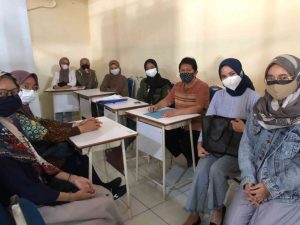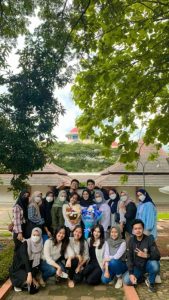It turns out that the students’ innovation can be a solution to the problems faced by society and will lead Indonesia to become a developed country. As was done by a student of the Industrial Chemical Engineering Technology Study Program (TRKI) at the Dipoengoro University Vocational School (UNDIP), namely Ahlisan Rahmawati. The student, nicknamed Ahlisan, has completed the TRKI applied bachelor’s degree with his research supervisor, Mohamad Endy Yulianto. Analissan said that thanks to the supervisor’s patience, he was finally able to obtain 3 granted patents. The patents were granted with the invention titles: “Method for Making Hesperidin from Lime Peel via Microwave Thermochemical Extraction” (Patent no IDS000007235), “Linamarin Extraction Process from Cassava Leaves Using an Enzymatic Inactivation Extractor” (Patent no IDS000006687), and “Separation of Theaflavin from Tea using an Ultrafiltration Membrane” (Patent No IDS000005812),
Ahlisan, who currently works at PT. Firmenic Aromatics Indonesia said that its research entitled “Extraction of the Active Compound Hesperidin from Lime Peel (Citrus aurantifolia S) as an Immunomodulator Using the Microwave Assisted Extraction Method” by the supervisor was directed to be registered for a Simple Patent. This was assessed by the supervisor, that this theme was very prospective for commercialization to industry, after looking at the research data obtained from the Laboratory.


The research background is that because Indonesia is rich in biological natural resources, it is necessary to develop the potential of natural materials that can be used in various industries. One of them is used in the development of new drugs because this natural ingredient contains efficacious active compounds such as lime (Citrus aurantifolia Swingle). So far, lime fruit has only been consumed as an additional ingredient in dishes and drinks. “There has been no use of lime peel even though lime peel contains an active compound in the form of hesperidin which is useful as an immunomodulator,” explained Ahlisan.
Ahlisan explained that hesperidin has the potential to be an immunomodulator (increasing immunity in the human body) because it can capture free radicals resulting from the metabolism of the chemotherapy agent doxorubicin and prevent a decrease in the immune system which can cause various kinds of infections. This compound is also able to bind host cells (target proteins) to viruses so that it can become a natural compound to prevent the beta-corona virus (SARS-CoV-2) which causes Covid-19. Hesperidin acts as a chemopreventive agent for carcinogenesis, inhibiting cancer cell proliferation and tumorigenesis.
Extraction of hesperidin using microwaves is considered more efficient because of the presence of microwave radiation on the feed and solvent molecules, so that it absorbs electromagnetic energy which is known as dielectric heating. While the heated molecules are electric dipole, the molecules will experience movement and ionic conduction phenomena occur which cause mass and heat transfer to increase with the use of nonpolar solvents. “As a result, the extraction results of the hesperidin compound can achieve the best operating conditions with maximum results,” added Ahlisan.
Currently, research is still continuing to junior level and is starting to collaborate with the pharmaceutical industry to make nano hesperidin herbal medicine into capsule form. “Hopefully in the future this product can be commercialized, so that the research results can be useful for society, especially people who are struggling to recover from disease,” concluded Ahlisan.


Recent Comments